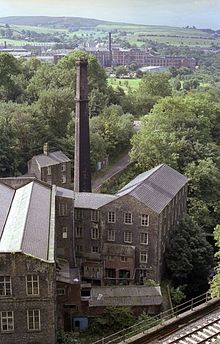Torr Vale Mill
The mill was built in the late 1780s by Daniel Strafford and was known as Strafford's Mill. It was powered by two waterwheels to spin and weave cotton. It was rebuilt in 1856 and a steam engine was added. It continued to be driven by steam and water till the 1940s when electricity took over. It was still in use producing towelling products until December 2000, the longest continuous period of cotton production in the UK. Since 1998 there have been various plans by the new owner, Chemquip Ltd., to renovate and develop the mill. This is now well underway and the new events floor has been used extensively by the community for a wide range of events. The Torr Vale Mill Preservation Trust in May 2001 and The Princes Regeneration Trust has also been seeking a solution.
In 2000 Torr Vale Mill was depicted on Royal Mail postage stamps to commemorate the Millennium Walkway in the Torrs Gorge. From this walkway, on the opposite side of the Gorge, dramatic views of the Mill may be had. In 2001 a fire destroyed one of the buildings of the mill. The mill remains in a lamentable state and, though now better secured, is at risk of further fire and vandalism. In 2010, Chad Bevan, a New Mills resident, won the Munro Trophy in the Derbyshire Open Arts Competition for his painting of the decaying Torr Vale Mill, the title being 'Lowes Mill'.
The Mill is on the English Heritage Heritage at Risk Register of Listed Buildings at risk through disuse and disrepair. The local Heritage Centre Trust is actively engaged in trying to secure the future of this abandoned building.

References
- ^ Historic England. "Torr Vale Mill, attached weir, sluice gates, watercourse walls, headrace arches, retaining walls and steps (Grade II*) (1119721)". National Heritage List for England. Retrieved 4 September 2014.
- ^ "About Us". Torr Vale Mill. Retrieved 16 December 2023.
- ^ Interpretation board on site.
- ^ Derbyshire Open Arts Winners 2010
- ^ Derbyshire Open Arts Competition 2010 Chad Bevan, Colette Payne use the mill as inspiration
- ^ "High Peak Planning Brief: Torrvale Mill" (PDF). May 2005. p. 17. Retrieved 26 February 2009.